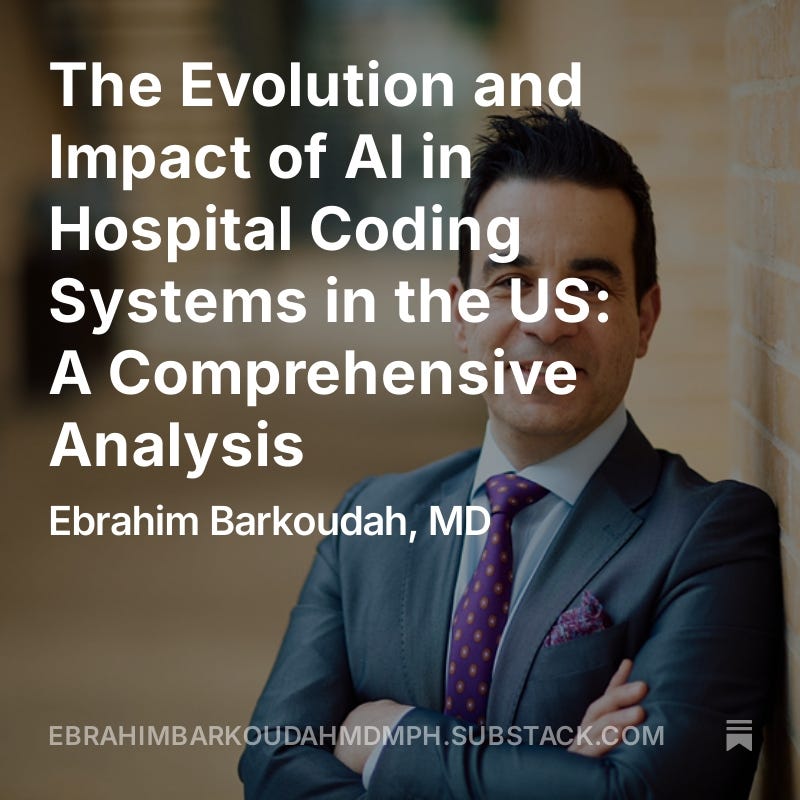Discover American Doctor Substack - Ebrahim Barkoudah MD
American Doctor Substack - Ebrahim Barkoudah MD

American Doctor Substack - Ebrahim Barkoudah MD
Author: Healthcare Economics & Quality
Subscribed: 0Played: 0Subscribe
Share
© Ebrahim Barkoudah M.D., M.P.H., M.B.A.
Description
Ebrahim Barkoudah MD Substack -Views are my own
Disclosure Statement: The ideas, opinions, and content expressed herein are solely my own and do not represent, reflect, or should be attributed to any organization, company, institution, or other entities.
Disclosure Statement: The ideas, opinions, and content expressed herein are solely my own and do not represent, reflect, or should be attributed to any organization, company, institution, or other entities.
9 Episodes
Reverse
The full article: This is a public episode. If you would like to discuss this with other subscribers or get access to bonus episodes, visit ebrahimbarkoudahmdmph.substack.com
The U.S. Revenue Cycle Management market is undergoing a rapid revolution driven by advancements in technology, regulatory changes, and evolving care delivery models. RCM plays a critical role in managing the financial processes of healthcare organizations, ensuring efficiency in billing, claims processing, and revenue collection. Emerging technologies such as artificial intelligence, machine learning, and automation enhance workflows, reduce errors, and streamline operations, while regulatory shifts demand providers to stay compliant with new reimbursement models. The RCM market will continue to evolve, adapting to factors like value-based care initiatives and patient-centric approaches. Stakeholders, including healthcare providers, payers, and technology vendors, must remain agile in responding to these dynamic trends. This proactive adaptation is essential for maintaining financial stability and delivering high-quality patient care. The U.S. RCM market is anticipated to hold a vital role in shaping healthcare organizations' operational and financial success. By staying informed and leveraging innovative solutions, industry players can effectively address ongoing challenges while preparing for future opportunities. This evolution underscores the importance of aligning financial management practices with the broader objective of improving the patient healthcare experience.Full article This is a public episode. If you would like to discuss this with other subscribers or get access to bonus episodes, visit ebrahimbarkoudahmdmph.substack.com
Executive SummaryThe increasing involvement of private equity in the U.S. healthcare sector has raised widespread concerns regarding its impact on patients, providers, and the overall healthcare system. This report examines the dual outcomes of private equity investment in healthcare, focusing on the significant financial returns for investors juxtaposed with the potential risks for patients and communities. Key issues explored in this report include rising healthcare expenses driven by aggressive billing practices, labor reductions that strain patient care, and a growing trend of rural hospital closures tied to PE ownership. Additionally, the lack of transparency surrounding PE acquisitions often keeps stakeholders, including patients and policymakers, unclear about the motivations and practices of these firms.This analysis underscores the importance of balancing innovation and efficiency with the ethical obligation to prioritize patient outcomes and access to care. By addressing the opaque and profit-driven nature of private equity in healthcare, stakeholders can work toward a system that fosters both financial sustainability and equitable health access for all.Policymakers and advocacy groups have begun responding with legislative and regulatory initiatives to address these challenges. State and federal policies aim to increase transparency, limit harmful cost-cutting measures, and evaluate the socioeconomic implications of PE investments. This is a public episode. If you would like to discuss this with other subscribers or get access to bonus episodes, visit ebrahimbarkoudahmdmph.substack.com
Full article:https://substack.com/home/post/p-153756785?source=queue&autoPlay=falseExecutive SummaryThe healthcare industry is witnessing a revolutionary transformation through the integration of Artificial Intelligence in hospital coding systems. This transformation represents a pivotal shift in how healthcare organizations manage their revenue cycles, ensure compliance, and maintain accurate patient records. This comprehensive analysis delves deep into the current state of AI-driven medical coding, examining the intricate challenges between hospital and insurance systems, sophisticated evaluation methods, and dynamic market forces. The analysis also explores innovative solutions for harmonizing these systems while considering their broader impact on healthcare delivery and financial outcomes. This is a public episode. If you would like to discuss this with other subscribers or get access to bonus episodes, visit ebrahimbarkoudahmdmph.substack.com
The healthcare industry stands at the cusp of a technological revolution driven by two transformative forces: Artificial Intelligence and quantum computing. While at different stages of development and implementation, these technologies are poised to fundamentally reshape how healthcare is delivered, managed, and advanced in the coming years. This comprehensive analysis explores the current landscape, prospects, and potential integration of these technologies in healthcare, examining their individual and combined potential to address healthcare challenges and improve patient outcomes.Artificial Intelligence is already being utilized to enhance diagnostics, personalize treatment plans, and streamline administrative tasks, reducing the workload on healthcare professionals. Meanwhile, quantum computing promises to solve complex data problems at unprecedented speeds, potentially unlocking breakthroughs in genomics and drug discovery. The synergy between these technologies could enable faster, more accurate insights, empowering healthcare systems to address critical challenges such as resource allocation and disease prediction. As these advancements evolve, their integration may lead to a more proactive, data-driven healthcare ecosystem prioritizing precision and efficiency.The Current State of AI in HealthcareArtificial Intelligence has already established a significant presence in healthcare, with numerous applications actively deployed across various domains. AI algorithms have demonstrated remarkable capabilities in interpreting radiological images, including X-rays, CT scans, and MRIs in medical imaging and diagnostics. This implementation has led to more accurate and expedited detection of abnormalities, enabling healthcare providers to identify potential health issues earlier and more precisely.The realm of personalized medicine has particularly benefited from AI's analytical capabilities. By processing vast amounts of patient data and genetic information, AI systems can help healthcare providers tailor treatments to individual patients' specific needs and characteristics. This personalization extends beyond treatment selection to include drug dosage optimization and predicting potential adverse reactions, marking a significant step toward genuinely personalized healthcare delivery.Virtual health assistants powered by AI have emerged as valuable tools for patient support and engagement. These systems provide real-time assistance to patients, helping them manage their health conditions, medication schedules, and lifestyle modifications. Implementing these virtual assistants has improved patient compliance with treatment regimens and reduced the burden on healthcare providers by handling routine inquiries and monitoring tasks.Administrative Efficiency and Operational ImpactOne of the most immediate and tangible benefits of AI in healthcare has been its impact on administrative efficiency. Healthcare facilities have implemented AI-driven systems to streamline various operational tasks, including appointment scheduling, billing processes, and documentation. This automation has significantly reduced the administrative burden on healthcare professionals, allowing them to focus more time on patient care. Reducing paperwork and improving operational efficiency has translated into cost savings and enhanced patient satisfaction.AI tools have improved data handling accuracy, minimizing errors associated with manual input. Predictive analytics integrated into these systems can assist in resource allocation, ensuring optimal utilization of staff, equipment, and facilities. Furthermore, advanced machine learning algorithms can identify patterns in patient data, providing insights that aid in proactive care planning. These technological advancements promote operational excellence and pave the way for a more patient-centered healthcare experience.Drug Discovery and DevelopmentThe pharmaceutical industry has witnessed a transformation in drug discovery processes through AI implementation. AI systems can analyze vast datasets of molecular structures, chemical properties, and biological interactions to identify potential drug candidates more efficiently than traditional methods. This capability has accelerated the drug discovery process and reduced the associated costs, potentially leading to faster development of new disease treatments.Additionally, AI-powered simulations can predict the efficacy and safety of drug candidates, minimizing the need for extensive laboratory testing in preliminary stages. Machine learning algorithms are also being used to personalize medicine by identifying patient-specific responses to treatments, paving the way for more precise and effective therapies. Furthermore, by leveraging AI for data analysis, pharmaceutical companies can uncover hidden patterns in clinical trial data, optimize trial design and enhance outcomes. These advancements demonstrate AI's potential to revolutionize drug discovery and the pharmaceutical industry's overall efficiency and accuracy.Market Growth and Economic ImplicationsThe economic impact of AI in healthcare is substantial and growing. Current market analyses project that AI in the healthcare market will expand from USD 20.9 billion in 2024 to an impressive USD 148.4 billion by 2029, representing a compound annual growth rate of 48.1%. This remarkable growth trajectory reflects the increasing adoption of AI technologies across various healthcare applications and the recognition of their value in improving healthcare delivery and outcomes.This investment and implementation surge is driven by factors such as the rising prevalence of chronic diseases and the growing demand for personalized medicine. AI-powered tools enable more efficient workflows, reduce operational costs, and enhance diagnostic accuracy, all of which contribute to economic efficiencies within the healthcare sector. Furthermore, advancements in machine learning algorithms and access to vast amounts of medical data are accelerating the development of innovative solutions tailored to patient care. As AI matures, its economic potential will likely extend beyond traditional healthcare settings, shaping the future of preventative medicine, telehealth, and population health management.Adaptive AI and Future TechnologiesThe emergence of adaptive AI systems is a particularly promising development in the AI healthcare landscape. These advanced systems can modify their algorithms in real time based on new data and changing conditions, offering unprecedented flexibility and accuracy in healthcare applications. The market for adaptive AI is expected to reach USD 12,534.54 million by 2029, indicating strong confidence in this technology's potential to revolutionize healthcare delivery.These systems excel in predictive analytics, enabling healthcare providers to anticipate patient needs and intervene more effectively. For instance, adaptive AI can analyze vast datasets to predict disease outbreaks or detect patterns that might indicate early signs of chronic illness. Furthermore, their ability to learn continuously ensures they remain relevant and accurate as medical knowledge evolves. By integrating adaptive AI into healthcare infrastructure, the potential for improved patient outcomes and streamlined operations is vast, fostering a new era of data-driven medicine.The Quantum Computing FrontierWhile AI has already established a strong presence in healthcare, quantum computing represents the next frontier of technological advancement. In its early stages of development, quantum computing offers unique capabilities that could transform various aspects of healthcare delivery and research.By harnessing the principles of quantum mechanics, quantum computing has the potential to process vast datasets at unprecedented speeds, enabling deeper insights into complex medical conditions. This could greatly enhance the accuracy of diagnostics, allowing for earlier detection of diseases and more personalized treatment plans. Additionally, quantum algorithms may revolutionize drug discovery by simulating molecular interactions with a level of precision unattainable by classical computers. As research in this area progresses, the integration of quantum computing into healthcare could redefine the boundaries of what is possible in medical science.Drug Discovery and Molecular ModelingOne of the most promising applications of quantum computing in healthcare is in drug discovery and development. Quantum computers possess the unique ability to model molecular behavior at the quantum level, enabling more accurate predictions of drug-target interactions and potential side effects. This capability could significantly accelerate the drug discovery process and lead to the development of more effective treatments. This technology allows researchers to simulate and analyze complex molecular structures and chemical reactions that are currently beyond the reach of classical computing. By identifying optimal molecular compositions and uncovering new compound combinations, quantum computing has the potential to revolutionize early-stage pharmaceutical research. Additionally, the ability to predict molecular interactions more precisely could reduce the need for extensive physical trials, saving both time and resources. As quantum hardware and algorithms continue to advance, the integration of this technology into drug discovery workflows may pave the way for groundbreaking therapies and personalized medicine solutions.Genomic Analysis and Precision MedicineQuantum computing shows particular promise in genomic analysis, where its computational power could accelerate the identification of genetic markers associated with various diseases. This capability could revolutionize our understanding of genetic diseases and enable more precise therapeutic approaches. The ability to process and analyze vast amounts of genetic data more efficiently than clas
Are Nonprofit Hospitals Earning Their Tax Breaks? Data Reveals Concerning GapsNonprofit hospitals receive billions in tax breaks each year in exchange for providing care to their communities. But new research suggests many aren't holding up their end of the bargain.These hospitals received about $24.6 billion in tax exemptions in 2020, according to Kaiser Family Foundation data. Yet many struggle to demonstrate they're providing an equivalent value in charitable services. The arrangement represents a significant social contract that deserves closer scrutiny.The average nonprofit hospital spends about 7.5% of operating expenses on community benefits - things like uncompensated care, health education, and research. That's often less than the value of their tax breaks, which typically run 5-10% of revenue. Even more concerning: When researchers applied standardized criteria to evaluate 2,563 nonprofit hospitals, only 62% met minimum community benefit standards.The implications are significant since tax exemptions represent public resources meant to help vulnerable patients. However, the challenges these institutions face are complex. Hospitals grapple with staffing shortages, rising operational costs, and intense competition from for-profit facilities. Those serving low-income areas often face the greatest difficulties balancing charitable obligations with financial sustainability.Some states have begun addressing these issues by implementing enhanced oversight programs and requiring detailed reporting of community benefits. Early research indicates this increased accountability leads to higher levels of charitable care delivery.As healthcare costs continue to rise, the debate extends beyond whether nonprofit hospitals can justify their tax breaks. The fundamental question is whether the current system effectively serves communities in need. The data suggests room for improvement in ensuring these valuable tax exemptions translate into meaningful community benefits. This is a public episode. If you would like to discuss this with other subscribers or get access to bonus episodes, visit ebrahimbarkoudahmdmph.substack.com
This is a public episode. If you would like to discuss this with other subscribers or get access to bonus episodes, visit ebrahimbarkoudahmdmph.substack.com
This is a public episode. If you would like to discuss this with other subscribers or get access to bonus episodes, visit ebrahimbarkoudahmdmph.substack.com
This is a public episode. If you would like to discuss this with other subscribers or get access to bonus episodes, visit ebrahimbarkoudahmdmph.substack.com













